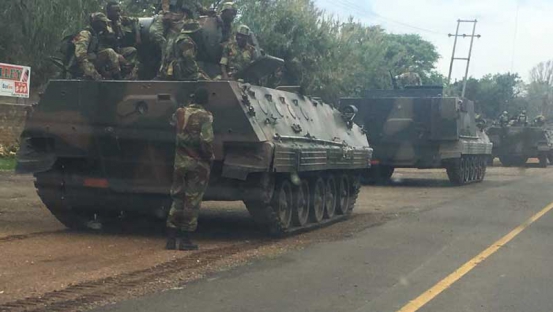
Tensions reached a boiling point in Zimbabwe’s capital on Tuesday as military tanks were seen rolling through the streets of Harare, sparking widespread concerns of an impending coup. The sudden military presence has left citizens and political analysts alike on edge, with speculation mounting about the stability of the government and the future of President Emmerson Mnangagwa’s administration.
Eyewitnesses reported seeing tanks and military vehicles stationed at key government buildings and near the presidential palace, while armed soldiers were seen patrolling key intersections. Social media was flooded with images and videos of the armored vehicles, which quickly went viral, amplifying fears of a potential power grab.
In response to the growing speculation, government officials have yet to provide a clear statement on the nature of the military’s movements. President Mnangagwa, who assumed office in 2017 after the dramatic ousting of long-time leader Robert Mugabe, has faced increasing pressure from opposition groups and critics over allegations of corruption, economic mismanagement, and human rights abuses. This has led many to question whether the military’s actions are part of a larger political maneuver.
An official from the Zimbabwean Defense Forces (ZDF) insisted that the military’s movements were routine and not related to any planned coup. However, the lack of immediate clarification has fueled further unrest and raised questions about the country’s political stability.
Zimbabwe has been gripped by political unrest for months, with mass protests against rising fuel prices, hyperinflation, and shortages of essential goods. Many believe that the military may have become a critical player in the country’s political landscape, either as a stabilizing force or as a potential source of political change.
The country’s main opposition party, the MDC Alliance, led by Nelson Chamisa, has called for an urgent meeting of Parliament, warning that the military’s presence in Harare could mark the beginning of an authoritarian shift. Chamisa and other opposition leaders have repeatedly criticized the government’s handling of the economy and its failure to address the needs of ordinary Zimbabweans.
The current crisis is reminiscent of the 2017 coup that resulted in the removal of Robert Mugabe after 37 years in power. At the time, the military played a key role in forcing Mugabe to step down, with many observers calling it a “soft coup.” While Mnangagwa, who was Mugabe’s deputy at the time, took over as president, his rule has been marred by ongoing economic challenges and political polarization.
Zimbabwe’s military has long been a powerful institution in the country, often intervening in politics to maintain control. The nation’s turbulent history of coups, contested elections, and military involvement in political transitions has left many Zimbabweans wary of further instability.
The international community has closely monitored the situation, with neighboring countries, as well as the United Nations, calling for restraint and urging all parties to respect the rule of law. The African Union, which has long championed stability and democracy on the continent, issued a statement urging the Zimbabwean government and military to resolve tensions through peaceful dialogue.
Regional powers such as South Africa and Zambia have also expressed concern about the potential for unrest spilling over into neighboring nations, particularly given the economic challenges and refugee issues that could arise in the wake of a destabilized Zimbabwe.
The military’s actions could have a significant impact on Zimbabwe’s fragile economy. Already struggling under the weight of sanctions, high unemployment, and soaring inflation, the country’s economic situation could deteriorate further if the political crisis deepens. Foreign investment, vital for the country’s recovery, is likely to be deterred by uncertainty, while businesses could face disruption from an unstable environment.
The Zimbabwean dollar has already taken a hit in international markets, with analysts predicting that a full-blown crisis could further exacerbate the country’s dire financial situation. While the military has not taken overtly hostile action yet, the uncertainty surrounding its movements has prompted concern among investors and ordinary citizens alike.
As the situation continues to unfold, all eyes are on President Mnangagwa and the military, with the nation waiting for clarity on whether the tanks in the streets are a sign of a political shift or a temporary show of force. Citizens remain fearful of the potential for violence, while opposition leaders continue to call for dialogue and peaceful resolution.
With the international community closely watching the developments, Zimbabwe’s political future hangs in the balance. Whether this marks the beginning of another chapter of military influence or a new path toward democracy remains uncertain. However, the country’s history of military intervention and political upheaval suggests that this may not be the last time the tanks roll through Harare.

